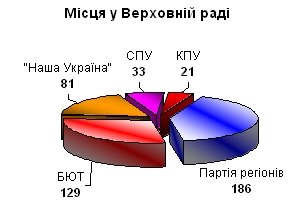
We look at the pie chart representing the composition of new Vekhovna Rada and see five different, evenly colored blocs with numbers alongside. It looks pretty.
Reality is much more complex, particularly in Ukrainian politics. A good example of lack of political discipline was the vote in the VR 10th January 2006 on the motion to fire Yekhanurov and dismiss his government after their inept and devious renegotiation of gas supply contracts with Russia. There were 250 votes supporting the motion to dismiss, and 50 against against out of a VR total of 450.
19 of Our Ukraine's deputies voted against, but 21 abstained, or more correctly 'didn't vote'. Anatoliy Kinakh's PPPU party showed similar indiscipline - 13 'didn't vote' and only 1 voted against the motion. [Kinakh is #2 on the NSNU election list - behind #1 Yekhanurov!]
Of the big three parties, NSNU are perhaps the most likely to splinter into various factions. In the event that their leadership agrees to form an Orange coalition together with the Socialists and BYuT, at least 64 of their 81 deputies must support any vote in the VR to carry any motion [assuming that no Socialist or BYuT deputies decide to 'throw a wobbly' and rebel]. Previous perfomance then do not provide any confidence that an Orange coalition would be sustainable for any long period.
An RU - NSNU coalition looks more stable, with RU + Communists holding 207 votes. But they would need at least 19 of NSNU's 81 deputies to support them and carry any motion; in an often febrile VR, with the mistrust and hostility between NSNU and RU, even this cannot be guaranteed with any degree of certainty.
New rules are being introduced to prevent deputies hopping from bloc to bloc, but I understand this will not prevent any deputy who does so from voting - there is no mechanism forcing him to give up his voting mandate even if kicked out of his [or her] party.
There are deep rumblings of discontent in RU party too, inside which "prison rules operate", according to an article entited 'Party of Region threatened by split, and some party members are [even] beaten by their bosses.'
Many members are " tired of the fear, which rules inside its party organization." Each party leader has "lads' who can cripple us," claim some intimidated RU members. However if RU were to be driven into opposition then surely the the likelyhood of internal fissures occurring will increase. "If our party falls apart, most of its members would be ready to go over to our opponents. At least the Donetsk members of PR would certainly go over," they say. Some much-needed encouragement for the Orange forces there then.
The Donbass region can not be governed by one monolithic party for much longer, pluralist democracy will surely develop there soon.
In Friday night's interview on 5iy Kanal, which is well worth watching, Tymoshenko gave no indication of deviating from her election campaign pledges, i.e. [1] no coalition with RU under any circumstances, [2] BYuT will only enter into an orange coalition if she is PM [and, I assume, as senior partner, picks most of the ministers]. This puts the dampener on any possibility of 'grand coalition' or government of national unity which Yushchenko seems to favor.
Yushchenko tried to impose his authority on matters in a radio address today but I have the impression that Tymoshenko is not in the mood to compromise with anyone.
No comments:
Post a Comment